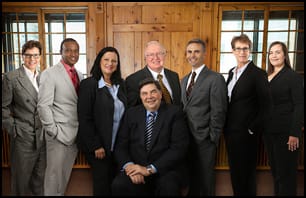Senate bill backs ‘severe or pervasive’ harassment standard
 By: Kevin Featherly March 20, 2019A Senate committee has passed a bill that would seal into statute the “severe or pervasive” judicial-review standard for sexual harassment claims. Critics have blamed that standard for blocking victims’ path to the courts.The bill, Senate File 2295 from Sen. Karin Housley, R-St. Marys Point, passed 5-4 in Senate Judiciary on March 15. Its three DFL members were joined by Sen. Bruce Anderson, R-Buffalo Township, in voting no.
By: Kevin Featherly March 20, 2019A Senate committee has passed a bill that would seal into statute the “severe or pervasive” judicial-review standard for sexual harassment claims. Critics have blamed that standard for blocking victims’ path to the courts.The bill, Senate File 2295 from Sen. Karin Housley, R-St. Marys Point, passed 5-4 in Senate Judiciary on March 15. Its three DFL members were joined by Sen. Bruce Anderson, R-Buffalo Township, in voting no.
Anderson did not explain his vote in committee. Later, through a GOP Senate spokesperson, he declined to comment on it.
Housley’s approach is the polar opposite of the House DFLers’ efforts. House File 10, from Rep. Kelly Moller, DFL-Shoreview, would upend the severe or pervasive standard.
“An intimidating, hostile or offensive environment … does not require the harassing conduct or communication to be severe or pervasive,” Moller’s legislation says.
In contrast, Housley’s bill would require that conduct be “sufficiently severe or pervasive to alter the terms or conditions of an individual’s employment” before it meets the legal threshold for sexual harassment.
Housley goes farther in several other ways, as well. Her bill asserts that Minnesota law “is not a general civility code” and that the state’s courts should not have to remedy “every incidence of inappropriate, rude or offensive behavior” in employment and various other settings.
It frames Minnesota’s Human Rights Act-under which sexual harassment claims frequently are brought-as “not a strict-liability statute.” If individuals or businesses are not aware sexual harassment has taken place, but otherwise have acted reasonably to prevent or correct it, they “should not be held liable for sexual harassment committed by others,” the Housley bill says.
Conduct or communication must be objectively and subjectively harassing under the totality of circumstances to qualify as harassment, it says. And it must be “sufficiently severe or pervasive.”
However, the bill also stipulates that a single incident could be enough to meet the latter test. That’s a big improvement over existing precedent, supporters said.
Still, embedding “severe or pervasive” into statute is an about-face for Housley. Last year, she authored the Senate companion to House File 4459, a bill from former House Majority Leader Joyce Peppin, R-Rogers, which mirrored Moller’s bill.
“Since then,” Housley testified Friday, “I’ve studied the issue more closely and we’ve continued to have the conversation here at the Capitol as to how to fix it.” She ended up changing her mind, she said.
Her bill, introduced on March 11, had not even been brought to committee before critics pounced.
“This bill seeks to simultaneously blame victims, side with harassers and protect employers who don’t address harassment from accountability,” tweeted Erin Maye Quade, a former legislator who now is advocacy director for the Gender Justice nonprofit. “I’m a no.”
Federal precedent
Housley said she has learned over time that the court precedents advocates have cited as evidence for ditching “severe or pervasive” were federal, not state cases. “So this bill focuses on the cases that actually identify as the problem,” she said.
SF 2295 cites four 8th Circuit U.S. Court of Appeals cases by name as the main offenders. By passing it, the Legislature would reject all four holdings and declare that its intent as a body is that courts should not be bound by them.
Those cases include Duncan v. General Motors Co. (2002); LeGrand v. Arch (2005); Anderson v. Family Dollar Stores of Ark., Inc. (2009); and McMiller v. Metro (2013). The Housley bill says all four are “inconsistent with the severe or pervasive standard for sexual harassment under state law.”
Ryan Mick, an attorney representing the Minnesota Employment Law Council, said that, if passed, the bill would make it easier for victims to have their day in court, because it rejects bad precedent and allows a single incident to trigger a valid claim. It also benefits the business community, he said.
“Even more important,” he said, “this bill incentivizes schools, businesses, libraries, movie theaters, gyms and others to take reasonable steps to prevent harassment and correct it if it happens-by making clear that those entities that take those steps won’t be liable for the harassment of others.”
Joe Weiner of the Littler law firm criticized the House proposal for excising the severe or pervasive standard without replacing it. That would be like forbidding speeding on the highways and failing to set a speed limit, he said.
But Leslie L. Lienemann, a St. Paul employment attorney, suggested that to set a proverbial “speed limit” on sexual harassment would communicate that sexual harassment is tolerable-within limits. “That’s the current state of the law,” she said.
If the bill is adopted, she said, the Legislature would be telling Minnesota women they must permanently tolerate at least some degree of sexual harassment at work.
Scott Beutel, public policy director for the state Human Rights Department, told the Senate committee that his department opposes the bill. And it’s not alone.
“Our understanding is that the governor would not support it,” Buetel said.
‘Something better’
A young woman named Ami, who asked that her full name not be used in print, appeared before the committee with a harrowing story of sustained harassment, which she endured from two customers while working as a suburban waitress. She told the same story before House Judiciary in February.
Her harassment continued for about a year while her bosses turned a blind eye, she said. A general manager even ignored an order for protection that she obtained and allowed the customers to keep visiting the restaurant. As a result they continued to paw at her and demand hugs. She called them “my stalkers.”
Eventually, she sued, but lost her case in arbitration when mediator Mary Pawlenty ruled she had failed to meet the federal severe or pervasive test. But Pawlenty also blasted management for failing to help her. Ami, Pawlenty wrote, “deserved better from her employer.”
In an interview Monday, Sen. Jerry Relph, a former city attorney who once ran a private practice, said he thinks Pawlenty was wrong. The treatment Ami endured, to Relph’s mind, was both severe and pervasive. Her case should have survived summary judgment, he said.
Relph, who voted for the bill, said he likes that it allows a single incident to trigger a viable sexual harassment complaint. That put proper emphasis on the word “or” in the clause “severe or pervasive,” he said. Federal precedent seems to treat the article in that clause as an “and,” he said.
However, Sheila Engelmeier, an employment attorney who testified against the bill Friday, suggested that “severe or pervasive” is a standard that defies fixing. “It’s a flawed standard,” she said. “It’s just messed up.”
In an interview, Engelmeier said Housley’s supporters are wrong to suggest that, by singling out a handful of bad precedents, the new law will steer state courts toward better results. There are hundreds of federal and state cases that adopt the offending standard, she added.
“Suggesting that disagreeing with a few of them is going to somehow disavow all of those many hundreds, it’s just a fallacy,” she said. “That is not going to happen. Because the Minnesota courts have now adopted the standard.”
Although the existing statute has effectively been superseded by the courts, Engelmeier said that Section 363A.03, as now written, is far better than what Housley proposes.
That law defines sexual harassment as “unwelcome sexual advances, requests for sexual favors, sexually motivated physical contact or other verbal or physical conduct or communication of a sexual nature” when held out as a condition of employment or when it interferes with employment. It makes no reference to “severe or pervasive.”
“My point is the Minnesota statute is something better,” she said. “And so let’s leave it as what we have.”
After it passed 5-4 on Friday, the Housley bill was sent directly to the Senate floor to await a vote. It had the second of its three required readings on the Senate floor Monday.
House File 10, meanwhile, is due for a House floor vote March 21.

